Matcha powder is a finely ground powder made from green tea leaves and has become increasingly popular due to its many health benefits.
While the quality of green tea leaves ultimately affects the taste of matcha, the process in which it’s produced makes a difference as well.
The vibrant green color and unique flavor come from the special way matcha powder is grown, harvested and ground.
While some people enjoy the flavor and vibrant color of matcha powder, not everyone has access to it or enjoys the taste.
Luckily, there are several substitute ingredients that work great in place of matcha powder for baking and making lattes.
Let’s take a look at five common alternatives for matcha powder so you can get creative with your recipes.
What’s Matcha Powder?

Matcha is a type of powdered green tea made from the finely ground leaves of Camellia sinensis, the same species of plant used to make other types of tea such as oolong, white and black teas.
As with these other teas, matcha has its roots in China but has been consumed by Zen Buddhist monks in Japan since the 12th century.
Matcha consists of special shade-grown green tea plants that are steamed and then dried before being shaped and powdered into a fine dust-like consistency.
The powder is consumed as a hot or cold drink either by itself or combined with warm water or milk and various flavorings added to create lattes, smoothies and other beverages.
In addition to being high in caffeine for an energy boost, matcha powder is also packed full of powerful antioxidants like polyphenols that can help support overall health.
This unique combination makes it popular among fitness enthusiasts and those looking for an alternative to coffee or standard green tea.
How to Use Matcha Powder?
Matcha powder is a green tea powder made from ground green tea leaves.
It’s often used in traditional Japanese tea ceremonies but has recently become popular in both cooking and baking.
Matcha powder is extremely versatile and goes well with both savory and sweet recipes.
Here are five ways to use matcha powder in the kitchen:
- Matcha Latte – A matcha latte is made by whisking together hot water and matcha powder until it forms a creamy and frothy texture. Some recipes also call for coconut milk or almond milk, honey and other flavorings to make a delicious drink.
- Matcha Ice Cream – You can easily add matcha powder to homemade ice cream or store-bought ice cream for an extra burst of flavor. The bright green color looks great as well.
- Smoothies – Mix matcha powder into a smoothie for an added boost of antioxidants and natural energy. Add some fruit, yogurt, honey, or nut butter for a delicious smoothie that’s perfect any time of day.
- Cookies – The earthy flavor of the matcha pairs perfectly with other baked goodies such as cookies, cakes, muffins, etc., giving them an interesting flavor while also making them naturally more nutritious.
- Pancakes/Waffles – Don’t forget about breakfast. Mix some powdered matcha into your next batch of pancakes or waffles for a light green hue that tastes just as good as it looks. You can also use different sweeteners such as maple syrup or honey to offset the bitterness in the matcha powder if desired.
5 BEST Matcha Powder Substitutes You Should Consider
Matcha powder is a popular ingredient in many dishes, drinks, and desserts.
It is made from ground green tea leaves and has a mild flavor.
While matcha powder can be expensive—especially the ceremonial grade powder—there are other options that can be just as flavorful, though some won’t carry the same health benefits.
If you’re looking for an alternative to matcha powder, here are 5 GREAT substitutions that you may want to consider.
1 – Green Tea
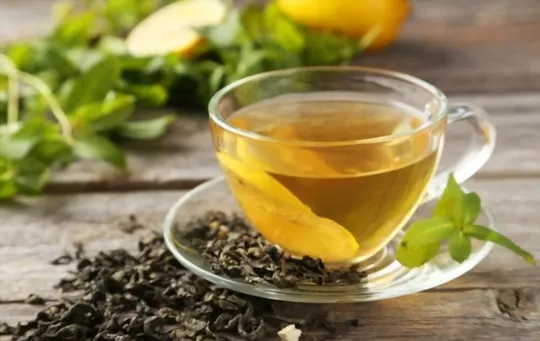
Green tea is the closest substitute for matcha powder and is the most natural alternative.
It has a light, grassy flavor and can be used to make iced or hot tea.
It contains significantly less caffeine than matcha strength-wise, but if you add more of it than you would with matcha, it could give you a similar boost of energy.
Green tea should be brewed much longer to draw out the full flavor, so pay attention to brew times when substituting with green tea.
Brewing time depends in part on what kind of green tea you have chosen; typically, one teaspoon of loose leaf green tea per 8-ounce cup of water should be steeped for two minutes.
Another consideration is that although green tea has many antioxidants similar to those found in matcha powder, it does not contain as high concentrations as traditionally whisked matcha.
2 – Yerba Mate
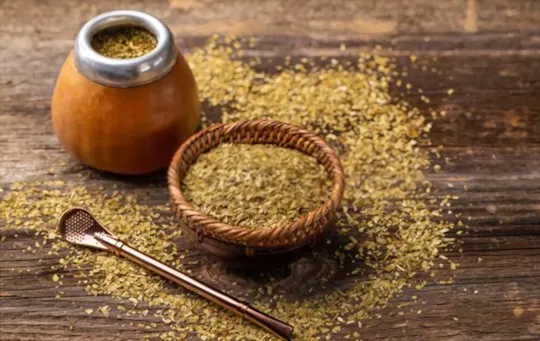
Yerba Mate is a South American tea powder highly valued for its energizing and metabolism-boosting properties.
Derived from the leaves of the rainforest, Yerba Mate contains high amounts of caffeine and antioxidants, as well as polyphenols, vitamins, and minerals.
Despite its low caffeine content (60-90mg per cup), this dark and smoky beverage is a great alternative to Matcha thanks to its earthy flavor profile.
Whether you brew a hot or cold cup of Yerba Mate requires different brewing instructions, so be sure to check out recipes online for making the best cup for you specific needs.
Some people opt to add sugar or honey, while others like theirs unsweetened.
This drink can definitely be enjoyed straight or added to smoothies or baked goods for an extra boost.
3 – Spirulina Powder
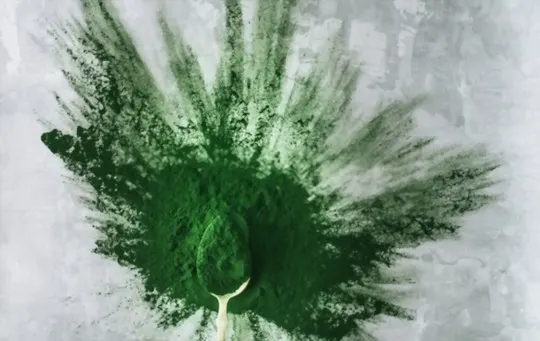
Spirulina powder is another great substitute for matcha powder as it’s loaded with beneficial vitamins and minerals.
It provides a slightly bitter flavor and also increases metabolism, offers cardiovascular protection, boosts immune function, and helps to cleanse the body.
Spirulina has a powerful detoxifying effect, which makes it an excellent choice for people who are looking to remove harmful toxins from the body.
Additionally, spirulina is easy to find in many health food stores and online stores, making it one of the most accessible substitutes on this list.
4 – Barley Grass Powder
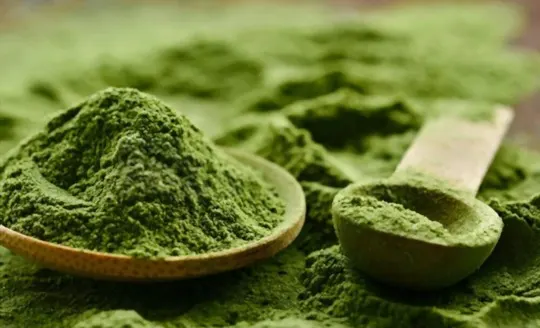
Barley grass powder can be used as a substitute for matcha powder in recipes and drinks.
Made from the dried grass of the barley plant, barley grass is rich in vitamins A, B, C, and E and minerals including potassium, phosphorus, calcium, magnesium and iron.
It has a mild taste similar to matcha powder with added health benefits associated with lactic acid convalescence.
Barley grass powder is often used as a nutritional supplement yet can also be used in smoothies or sprinkled over salads for extra flavor.
When substituting it into recipes that require Matcha powder, simply use a ratio of 1:1 to achieve the desired flavor.
5 – Moringa Powder
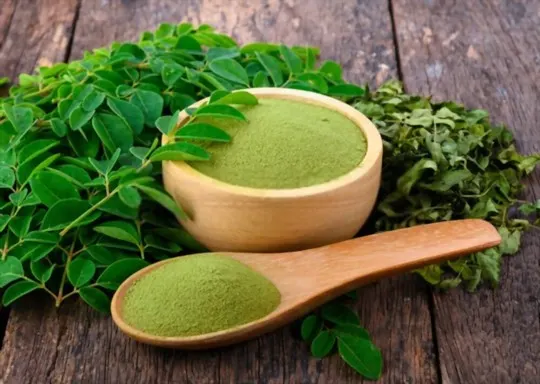
Moringa powder is made from the leaves of the Moringa oleifera tree, a highly nutrient-dense plant native to India, Africa, and Asia.
It’s rich in vitamins and minerals, including calcium and vitamin C as well as high levels of antioxidants.
As a matcha powder alternative, it has a slightly sweet taste, nutty aroma and vibrant green color that provide an excellent substitute for baking dishes or lattes.
You can also use it to make smoothies or whipped drinks.
Moringa powder is easily found in health food stores or online and can be stored for up to two years.
When using it as a matcha powder replacement, be sure to use about twice as much for the same amount of flavor.
Conclusion
Matcha is a fine powder produced from shade-grown green tea leaves.
It’s bright green in color and has a unique flavor.
Matcha powder is packed with antioxidants, vitamins, and minerals, although it does contain some naturally occurring caffeine.
For those looking for an alternative to matcha powder or can’t find one locally, there are several common substitutes available.
These substitutes include turmeric, spirulina powder, moringa powder, barley grass powder, and wheatgrass powder.
All of these alternatives have various nutrition profiles and uses and the chosen substitute should be based on individual needs and preferences.
While they are generally a good choice for making smoothies or lattes when cooked they will often not produce a green color like true matcha would but instead yield yellow or brown products.
Overall, there are several healthy substitutes for matcha available that provide unique flavors as well as different nutrition profiles enough to combine them all for different recipes.
As always it is important to do your own research before adding any unfamiliar ingredients into your recipes.
Frequently Asked Questions
What is matcha powder?
Matcha powder is a high-quality green tea powder made from whole tea leaves that have been stone-ground into a very fine powder.
It has a rich, vegetal flavor and is often used in traditional Japanese tea ceremonies.
What are the benefits of consuming matcha powder?
Matcha powder is rich in antioxidants, vitamins, and minerals, making it a healthy choice for many people.
It also has been linked to increased energy, improved concentration, and increased metabolism.
What are the best substitutes for matcha powder?
The best substitutes for matcha powder include green tea leaves, matcha latte mix, spirulina powder, moringa powder, and chlorella powder.
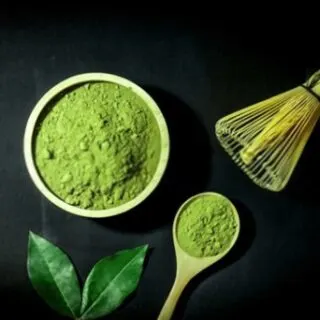
5 BEST Matcha Powder Substitutes You Should Consider
Ingredients
- 1 – Green Tea
- 2 – Yerba Mate
- 3 – Spirulina Powder
- 4 – Barley Grass Powder
- 5 – Moringa Powder
Instructions
- Choose your preferred substitute from the list of options.
- Organize all of your ingredients.
- Use the proper substitute to cook your recipes.

Carrie is a food writer and editor with more than 15 years of experience. She has worked for some of the biggest names in the food industry, including Bon Appétit, Food & Wine, and Martha Stewart Living.
As the Editor in Chief of IntroChicago.com, Carrie oversees all of the content on the site. She also manages the team of contributing writers and editors, who help to create delicious recipes, helpful tips, and informative articles that you’ll find on the site.
A native of the Chicago area, Carrie is passionate about all things food. She loves trying new restaurants and experimenting with new recipes in her kitchen. She’s also a graduate of the Culinary Institute of America, so she knows a thing or two about food!
